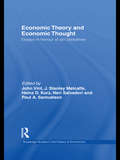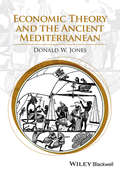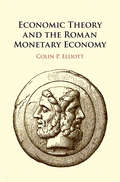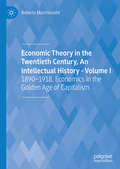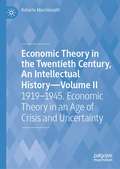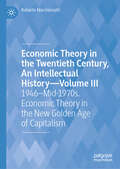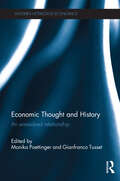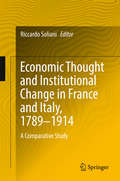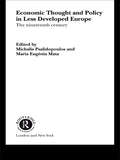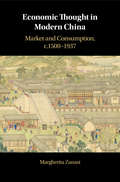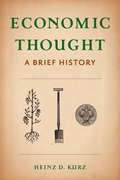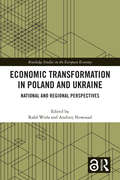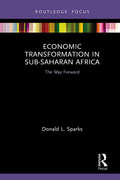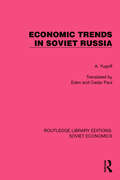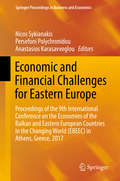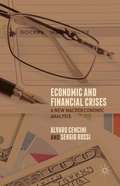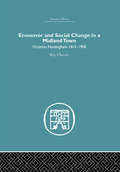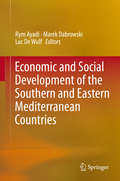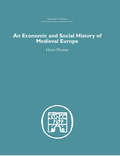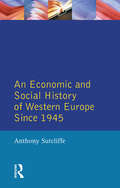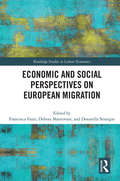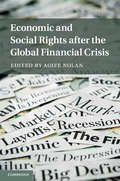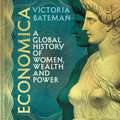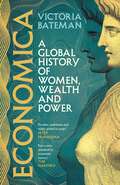- Table View
- List View
Economic Theory and Economic Thought: Essays in Honour of Ian Steedman (Routledge Studies In The History Of Economics Ser.)
by John VintIan Steedman is recognised internationally as one of the leading economic theorists of his time and has made major contributions to the development of economic theory and economic thought, as substantiated by his work on Marx, Sraffa, Marshall, Jevons and Wicksteed. His contributions to economic theory include his work on time, international trade, capital theory and growth and distribution. This collection reflects the wide ranging interests of Ian Steedman and is a tribute to his outstanding contributions. This edited collection brings together twenty two new essays by distinguished economists from around the world. The papers cover a wide range of topics including; international trade – an area in which Steedman has made significant contributions; Sraffa, the history of economic thought and theoretical papers – including Faustian Agents and market failure in waste production. The essays in this book will be an invaluable source for economists interested in economic theory or in the evolution of economic thought. It will also be of interest to postgraduate and research students in economic theory and the history of economic thought. John Vint is Professor of Economics at Manchester Metropolitan University, UK. J. Stanley Metcalfe is Professor of Economics at the University of Manchester, UK. Heinz D. Kurz is Professor of Economics at the University of Graz, Austria. Neri Salvadori is Professor of Economics at the University of Pisa, Italy. Paul Samuelson is Professor of Economics at the Massachusetts Institute of Technology, USA.
Economic Theory and the Ancient Mediterranean
by Donald W. JonesEconomic Theory and the Ancient Mediterranean presents a comprehensive introduction to the application of contemporary economic theory to the ancient societies of the Mediterranean Sea from the period of 5000 BCE to 400 CE. Offers an accessible presentation of modern economic theory and its relationships to ancient societies Presents innovative expositions and applications of economic theory to issues in antiquity not often found in the literature Features insightful discussions of the relevance of contemporary economic models to various situations in antiquity Written for a broad range of scholars of ancient Mediterranean regions, including archaeologists, ancient historians, and philologists
Economic Theory and the Roman Monetary Economy
by Colin P. ElliottModern economics tantalizes historians, promising them a set of simple verbal and mathematical formulas to explain and even retrospectively predict historical actions and choices. Colin P. Elliott challenges economic historians to rethink the way they use economic theory. Building upon the approaches of Max Weber, R. G. Collingwood, Ludwig von Mises and others, Elliott reconceptualizes economic theories such as the quantity theory of money and Gresham's law as heuristic constructs - constructs which help historians identify and understand the unique modes of thought and embedding contexts which characterized economic action in the Roman Empire. The book offers novel analyses of key events in Roman monetary history, from Augustus' triumph over Mark Antony and Cleopatra, to third-century AD coinage debasements. Roman history has long been a battleground for polarizing methodological debates, but this book's accessible style and conciliatory tone invites historians, economists, sociologists and other scholars to use economic theory for understanding.
Economic Theory in the Twentieth Century, An Intellectual History - Volume I: 1890-1918. Economics in the Golden Age of Capitalism
by Roberto MarchionattiThis book, set out over three volumes, provides a comprehensive history of economic thought in the 20th century with special attention to the cultural and historical background in the development of theories, to the leading or the peripheral research communities and their interactions or controversies, and finally to an assessment and critical appreciation of economic theories throughout these times. It takes as its subject matter the canon of publications by major thinkers who self-consciously conceived of themselves as 'economists' in the modern academic sense of the term. It is a history of how, when and where the discipline of Economics took root in major universities and scientific communities of economists, and evaluates the emergence of different 'schools' of thoughts. Volume I addresses economic theory in the golden age of capitalism. It considers the contributions of Marshall, Pareto, Wicksteed, Schmoller, Bohm-Bawerk, Schumpeter, Wicksell, Fisher, Veblen and other major thinkers, as well as the universities of Cambridge, Lausanne, Vienna, Berlin, and some others in US, before concluding with a look at the impact that the great war had on the discipline. This work provides a significant and original contribution to the history of economic thought and gives insight to the thinking of some of the major international figures in economics as shown in major works published across the last 130 years. It will appeal to students, scholars and the more informed reader wishing to further their understanding of the history of the discipline.
Economic Theory in the Twentieth Century, An Intellectual History—Volume II: 1919–1945. Economic Theory in an Age of Crisis and Uncertainty
by Roberto MarchionattiThis book, set out over three-volumes, provides a comprehensive history of economic thought in the 20th century with special attention to the cultural and historical background in the development of theories, to the leading or the peripheral research communities and their interactions, and finally to an assessment and critical appreciation of economic theories. Volume II addresses economic theory in the period between the two world wars in which the economic theory went through a process of criticism of old mainstream, deconstruction and reconstruction and theoretical ferment which involved the intellectual communities of economists emphasizing their nature of evolving interacting entities. This work provides a significant and original contribution to the history of economic thought and gives insight to the thinking of some of the major international figures in economics. It will appeal to students, scholars and the more informed reader wishing to further their understanding of the history of the discipline.
Economic Theory in the Twentieth Century, An Intellectual History—Volume III: 1946–Mid-1970s. Economic Theory in the New Golden Age of Capitalism
by Roberto MarchionattiThis book, set out over four-volumes, provides a comprehensive history of economic thought in the 20th century. Special attention is given to the cultural and historical background behind the development of economic theories, the leading or the peripheral research communities and their interactions, and a critical appreciation and assessment of economic theories throughout these times.Volume III addresses economic theory in the period of the new golden age of capitalism, between the years from the end of the Second World War to the mid1970s, which saw the establishment of the new mainstream, in particular in its Harvard-MIT-Cowles version. It was the period of the pre-eminence of the Neoclassical Keynesian Synthesis—the theoretical core of the period’s dominant school of thought.This work provides a significant and original contribution to the history of economic thought and gives insight to the thinking of some of themajor international figures in economics. It will appeal to students, scholars and the more informed reader wishing to further their understanding of the history of the discipline.
Economic Thought and History: An unresolved relationship (Modern Heterodox Economics)
by Monika Poettinger Gianfranco TussetEconomic Thought and History looks at the relationship between facts and thought in historical economic research, viewing it in the context of periods of economic crisis and providing detailed analyses of methods used in determining the bond between economic history and economic theory. This interdisciplinary collection brings together international researchers in the history of economic thought and economic history in order to confront varying approaches to the study of economic facts and ideas, rethinking boundaries, methodologies and the object of their disciplines. The chapters explore the relationship between economic thought and economic theory from a variety of perspectives, exploring the relationship between history and economics, and the boundaries defining the history of economic thought, in terms of both single authors and schools of thought. The book offers particular insights on the Italian tradition of thought. The uniquely interdisciplinary and analytical approach presented here bridges the methodological gap between these disciplines, unearthing a fertile common ground of research. This book is intended for Postgraduate students conducting further research into the field, or for professors and academics of economic history and history of economic thought.
Economic Thought and Institutional Change in France and Italy, 1789–1914
by Riccardo SolianiThis book explores the relationship between economic thought, proposals for reform of political institutions, and civil society in the period between the rise to power of Napoleon and the eve of the First World War in Italy and France - two countries with a similar cultural and political tradition and with personal mobility of the intellectual class. The first section of the book is devoted to the struggle for identity, justice, and liberty, including its economic dimensions. The relation between political and economic freedom and its effect on equity is then addressed in detail, and the third, concluding section focuses on the intellectual and political conflict between the social visions of liberalism and socialism in some of their various forms, again with consideration of the economic implications. The comparative nature of the analysis, combined with its interdisciplinary approach to the history of economic and political thought and social history, will enable the reader to understand more clearly the historical evolution of each country and the relevant contemporary political and economic issues.
Economic Thought and Policy in Less Developed Europe: The Nineteenth Century (Routledge Studies in the History of Economics #Vol. 53)
by Michalis Psalidopoulos Maria Eugénia MataThe essays in this volume explore and discuss the process of dissemination of economic ideas among Europe's less developed countries and regions, as well as the interaction between economic thought and economic policy in different times and places during the nineteenth century. The comparative approach adopted sheds new light on the course of economic development in Europe's less developed countries in the nineteenth century and the role played by political economy. Amongst a host of others, the topics covered include: economic policy in Denmark monetary and trade policy in Norway the influence of the German Historical School in Finland land Reform and the abolition of serfdom in Russia and in Poland With contributions that disclose important insights into national traditions in economic thought and policy, and the diffusion of ideas in Europe, this work will be essential reading for all scholars of the history of economic thought.
Economic Thought in Modern China: Market and Consumption, c.1500–1937
by Margherita ZanasiIn this major new study, Margherita Zanasi argues that basic notions of a free market economy emerged in China a century and half earlier than in Europe. In response to the commercial revolutions of the late 1500s, Chinese intellectuals and officials called for the end of state intervention in the market, recognizing its power to self-regulate. They also noted the elasticity of domestic demand and production, arguing in favour of ending long-standing rules against luxury consumption, an idea that emerged in Europe in the late seventeenth and early nineteenth centuries. Zanasi challenges Eurocentric theories of economic modernization as well as the assumption that European Enlightenment thought was unique in its ability to produce innovative economic ideas. She instead establishes a direct connection between observations of local economic conditions and the formulation of new theories, revealing the unexpected flexibility of the Confucian tradition and its accommodation of seemingly unorthodox ideas.
Economic Thought: A Brief History
by Jeremiah Riemer Heinz D KurzIn this concise and strategic history, Heinz D. Kurz selects major moments in the development of economic ideas to portray the growth of the field and how economic insights are acquired, lost, and reborn. His timeline focuses on the dynamic individuals who give old ideas new life and the historical events that provoke the combination and recombination of different approaches and theories.Kurz begins with classical economics in ancient Greece and concludes with the visionary work of Kenneth J. Arrow and Amartya Sen. Among many other topics, he explains what Adam Smith meant by an "invisible hand"; how Karl Marx's "law of motion" works in capitalist economies; the roots of Austrian economists' emphasis on the problems of information, incomplete knowledge, and uncertainty; and John Maynard Keynes's principle of effective demand and economic stabilization. A final chapter sums up the major concerns of economists today and their relation to world events.
Economic Thought: A Brief History (Routledge Studies In The History Of Economics Ser.)
by Heinz KurzIn this concise yet comprehensive history, Heinz D. Kurz traces the long arc of economic thought from its emergence in ancient Greece to its systematic presentation among the classical thinkers of the late eighteenth and early nineteenth centuries to the influential work of scholars such as Paul Samuelson and Kenneth J. Arrow. With a keen eye for how economic insights are acquired, lost, and reborn, Kurz focuses on the dynamic individuals who give old ideas new life and the historical events that provoke different approaches and theories. Over the course of this journey, Kurz explains what Adam Smith meant by the "invisible hand"; how Karl Marx's "law of motion" works in capitalist economies; the roots of the Austrian economists' emphasis on the problems of information, incomplete knowledge, and uncertainty; John Maynard Keynes's principle of effective demand and economic stabilization; and the insights and challenges offered by growth theory, welfare economics, game theory, and more. He concludes with a deft summation of world economists' major concerns today and their critical relation to world events.
Economic Transformation in Poland and Ukraine: National and Regional Perspectives (Routledge Studies in the European Economy)
by Rafał Wisła; and Andrzej NowosadWhen Poland and Ukraine introduced their political, social and economic system reforms at the beginning of the 1990s, both economies were at a similar level of economic development (GDP $9,500 per capita). However, in 2018, Ukrainian GDP per capita had remained at the same levels since 1991, while in Poland, it had increased significantly, to more than $27,000 per capita. This book assesses the reasons for the growing gap between the level of economic development in Ukraine and Poland. It examines the course of events and evaluates the effectiveness of the system transformations, both in the context of the economy, as a whole, and in individual regions (Polish ‘voivodeships’ (provinces) and Ukrainian ‘oblasts’). It also analyzes the consequences of the 2008–2009 Ukrainian-Russian gas conflict and 2013–2014 Euromaidan events for the Ukrainian economy. Additionally, the authors offer an insight into the migration movements, which have recently been observed in Poland and Ukraine. This is the first comprehensive, comparative analysis concerning the spatial diversification of economic development in these two countries, and the authors highlight the ways in which these reforms have proved effective in Poland and hardly effective in Ukraine. This analysis helps to identify the basic interrelations between the core macroeconomic variables at the regional level and the impact of political events from both a national and regional perspective. The book will appeal to academics, researchers and policy makers interested in the economic and political changes in these two countries, in a comparative setting and on national and regional levels, as well as those working on issues of EU integration.
Economic Transformation in Sub-Saharan Africa: The Way Forward (Europa Introduction to...)
by Donald L. SparksSub-Saharan Africa is vastly diverse, and the 49 countries of the region range significantly in terms of population, size and economic scale. The region also differs in topography, climate, history, culture, languages and political systems. Given this vast diversity, it is, accordingly, difficult to draw general conclusions about the continent’s economic performance as a whole. Additionally, the lack of current statistics for several countries makes it difficult to make accurate assessments of economic conditions. Nevertheless, some broad comparisons can be made: of the world’s developing areas, sub-Saharan Africa has the worst record in virtually all of the most important social and economic indicators: the region has the lowest gross national income per head, the lowest life expectancy at birth, the lowest youth literacy rate, the highest rate of adult HIV infection and the highest number of children not living past five years of age. This volume begins by examining recent economic developments and trends. It then looks at the major economic constraints the region has faced in recent years, breaking down those constraints as either ‘external’ (e.g. terms of trade) over which the individual countries have but limited control, or ‘internal’ (e.g. governance and economic policy), over which there is more control. The book concludes by arguing that, despite the notable challenges cited above, sub-Saharan Africa is poised for a transformation, based on closer regional economic co-operation, a growing middle class, increased demand for locally produced goods and services, and a young population.
Economic Trends in Soviet Russia (Routledge Library Editions: Soviet Economics #5)
by A. YugoffEconomic Trends in Soviet Russia (1930) examines the economic position of the USSR a decade after the Revolution. It displayed the contradictions evident in an economy that had been isolated from the world economy while undergoing great changes, and where the government was taking control over all aspects of economic life. Huge factories had been established, yet the countryside remained pre-industrial; and while the economy was in theory entirely under State control, in practice currency crises, crises of production, gluts, crises of demand, pressed hard on one another’s heels, and were renewed again and again by the spontaneous play of economic forces.
Economic and Financial Challenges for Eastern Europe: Proceedings of the 9th International Conference on the Economies of the Balkan and Eastern European Countries in the Changing World (EBEEC) in Athens, Greece, 2017 (Springer Proceedings in Business and Economics)
by Anastasios Karasavvoglou Persefoni Polychronidou Nicos SykianakisThe papers in this proceedings volume were presented at the 9th international conference “The Economies of the Balkan and Eastern European Countries in the Changing World” (EBEEC) held in Athens, Greece, in April 2017. They include the scientific results of research on current issues relevant for the wider area of Eastern Europe. Authors from 30 different countries develop new ideas, covering topics such as international economies, European integration, the economic crisis, macroeconomics, banking, stock markets, education, energy, innovation, and marketing. The contributions also examine the role of the economies of the Balkan and Eastern European countries in a pan-European context.
Economic and Financial Crises
by Sergio Rossi Alvaro CenciniThis book deals with the structural origins of economic and financial crises. It provides a critical assessment of past and contemporary economic analyses and policies, which were in fact at the origin of a variety of major economic and financial crises that have been occurring since the end of the Second World War. The authors provide a novel approach to monetary macroeconomics, and show that only a sound understanding of money, credit and banking activities can avoid the occurrence of further systemic crises all around the world. The volume outlines reform proposals to make sure that both domestic and international transactions respect the bookkeeping nature of money and contribute thereby to reduce financial instability, increase employment levels and support sustainable economic activities, thus avoiding further global imbalances and sovereign debt crises.
Economic and Social Change in a Midland Town: Victorian Nottingham 1815-1900
by Roy A. ChurchThis book was first published in 1966. The city of Nottingham grew from the nucleus of a smaller and older town to become one of the nation's leading industrial centres, and although it was not a product of the industrial revolution Nottingham was completely transformed by it. For most of the nineteenth century the major activities were the production of hosiery by an industry whose methods, organization, and outlook remained traditional for many decades, and the manufacture of machine-made lace, a progressive and mechanized industry which from its early years featured factory production. This text explores the relationship between the development of power based machinery and the more traditional crafts of the area.
Economic and Social Development of the Southern and Eastern Mediterranean Countries
by Luc De Wulf Marek Dabrowski Rym AyadiThis book contains a unique collection of studies on key economic and social policy challenges faced by countries of the Southern and Eastern Mediterranean region in a short- and long-term perspective. Prepared within the EU funded FP7 project on ,,Prospective Analysis for the Mediterranean Region (MEDPRO)" conducted in 2010-2013 it takes account on recent political developments in the region (Arab Spring) and their potential consequences. It covers a broad spectrum of topics such as factors of economic growth, macroeconomic and fiscal stability, trade and investment, Euro-Mediterranean and intra-regional economic integration, private sector development and privatizations, infrastructure, tourism, agriculture, financial sector development, poverty and inequality, education, labor market and gender issues.
Economic and Social History of Medieval Europe
by Henri PirenneFirst published in 2005. Routledge is an imprint of Taylor & Francis, an informa company.
Economic and Social History of Western Europe since 1945, An
by Anthony SutcliffeThis is the ideal companion text to A Political History of Western Europe Since 1945. It is an introductory survey which explains how western Europe built up its postwar prosperity and is moving towards continental integration. Themes treated include: the origins of the EC; consumerism; youth culture and protest; immigration; the oil crisis and its aftermath; and the contrasting experience and expectations of the Nordic world and the Mediterranean south. The book ends with the consequences of Soviet collapse. Designed for general history students, it assumes no formal knowledge of economics, and is notably accessible and user-friendly in its approach.
Economic and Social Perspectives on European Migration (Routledge Studies in Labour Economics)
by Francesca FauriThis book addresses a wide range of migration-related issues in the European context and examines the socioeconomic consequences of migratory flows throughout Europe, focusing on a number of emblematic European countries. The book is divided into three parts. The first part deals with the tension between migrants and their integration processes in the receiving country, which is deeply influenced by the attitude of the local population and the different approach to highly and less skilled immigrants. The second part analyses the impact of migration on the economic structure of the receiving country, while the third part explores the varying degree of immigrants’ socioeconomic integration in the country of destination. The book offers an essential interdisciplinary contribution to the issue of migration and provides readers with a better understanding of the effects that different forms of migration have had and will continue to exert on economic and social change in host countries. It also examines migration policy issues and builds on historical and empirical case studies with policy recommendations on labour market, integration and welfare policy issues. The book is addressed to a wide audience, including researchers, academics and students of economics, sociology, politics and history, as well as government/EU officials working on migration topics.
Economic and Social Rights after the Global Financial Crisis
by Aoife NolanThe global financial and economic crises have had a devastating impact on economic and social rights. These rights were ignored by economic policy makers prior to the crises and continue to be disregarded in the current 'age of austerity'. This is the first book to focus squarely on the interrelationship between contemporary and historic economic and financial crises, the responses thereto, and the resulting impact upon economic and social rights. Chapters examine the obligations imposed by such rights in terms of domestic and supranational crisis-related policy and law, and argue for a response to the crises that integrates these human rights considerations. The expert international contributors, both academics and practitioners, are drawn from a range of disciplines including law, economics, development and political science. The collection is thus uniquely placed to address debates and developments from a range of disciplinary, geographical and professional perspectives.
Economica: A Global History of Women, Wealth and Power
by Victoria Bateman'Erudite, ambitious and richly global in scope' - PETER FRANKOPAN, author of The Silk Roads'This book sets a new standard in economic history' - TIM HARFORD, author of How To Make the World Add UpTHE UNTOLD STORY OF HOW WOMEN MADE THE WORLD WEALTHYHumanity's journey from poverty to prosperity is filled with men who have become household names. But how many female entrepreneurs, merchants and industrialists can you name?Economica places women at the centre of the story of economic growth. Starting in the Stone Age and continuing to the present day, it takes the reader through the key economic milestones of the past twelve millennia - from the birth of farming to the advent of computing - all told through the experiences of women as well as men.Historian Victoria Bateman weaves a thrilling, globe-spanning narrative that proves women weren't 'missing' from economic life, they were merely hidden from view. We discover the female workers who helped to build the Great Pyramid of Giza, and to plumb the city of ancient Rome; the silk weavers who made a vital contribution to the development of the Silk Road and global trade; the women who dominated London's brewing trade during medieval times; and the brave twentieth-century pioneers who fought to make our economies not just richer but fairer.Economica rewrites our understanding of women's role in the economy, and tells a more accurate economic history of us all.'Victoria Bateman's revelatory and compelling new book puts women at the very heart of mankind's economic history. Economica should help ensure that's where they will remain' - BEN CHU, BBC'A must-read for anyone interested in women's history and economic justice' - AMANDA FOREMAN, author of Georgiana and A World on Fire
Economica: A Global History of Women, Wealth and Power
by Victoria Bateman'Erudite, ambitious and richly global in scope' - PETER FRANKOPAN, author of The Silk Roads'This book sets a new standard in economic history' - TIM HARFORD, author of How To Make the World Add UpTHE UNTOLD STORY OF HOW WOMEN MADE THE WORLD WEALTHYHumanity's journey from poverty to prosperity is filled with men who have become household names. But how many female entrepreneurs, merchants and industrialists can you name?Economica places women at the centre of the story of economic growth. Starting in the Stone Age and continuing to the present day, it takes the reader through the key economic milestones of the past twelve millennia - from the birth of farming to the advent of computing - all told through the experiences of women as well as men.Historian Victoria Bateman weaves a thrilling, globe-spanning narrative that proves women weren't 'missing' from economic life, they were merely hidden from view. We discover the female workers who helped to build the Great Pyramid of Giza, and to plumb the city of ancient Rome; the silk weavers who made a vital contribution to the development of the Silk Road and global trade; the women who dominated London's brewing trade during medieval times; and the brave twentieth-century pioneers who fought to make our economies not just richer but fairer.Economica rewrites our understanding of women's role in the economy, and tells a more accurate economic history of us all.'Victoria Bateman's revelatory and compelling new book puts women at the very heart of mankind's economic history. Economica should help ensure that's where they will remain' - BEN CHU, BBC'A must-read for anyone interested in women's history and economic justice' - AMANDA FOREMAN, author of Georgiana and A World on Fire
